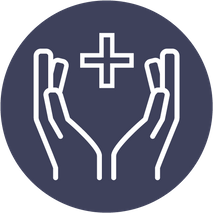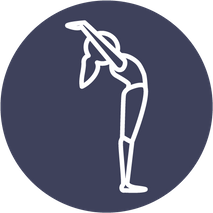
Vestibular Physical Therapy
AT EVOLVE
Vestibular Physical Therapy
HOW CAN VESTIBULAR PHYSICAL THERAPY HELP ME?
Vestibular physical therapy can benefit those who are experiencing dizziness, vertigo, feelings of unsteadiness or poor balance, sensations of the world moving around them and more. Many people living with these symptoms do not realize that physical therapists trained in vestibular rehabilitation can help. Vestibular physical therapy is aimed at reducing symptoms such as dizziness, vertigo, and disequilibrium, restoring balance with standing and walking, and helping you participate more comfortably and safely in daily activities.
WHAT DOES VESTIBULAR PHYSICAL THERAPY LOOK LIKE?
Like with all conditions, my team and I will begin by interviewing you about the symptoms you are experiencing, when they began, what makes them better or worse and so forth. We will perform specific examination techniques for the vestibular system as well as test your balance and possibly examine other related areas of the body such as your neck. Once a cause for your symptoms has been identified, we will create a customized treatment plan to address the cause using vestibular treatment techniques. You may also perform balance exercises, strengthening exercises or receive manual therapy treatment for related areas like your neck.
HOW LONG WILL I NEED VESTIBULAR THERAPY?
The duration of your treatment plan will depend on the cause of your symptoms and their severity. Some vestibular disorders can be resolved very quickly within one to two treatments while others will require ongoing care over several weeks to several months. Our team of therapists will work with you to determine the most effective frequency and duration of therapy to meet your goals and will aim to help you begin to feel better as quickly as possible.
VESTIBULAR SYSTEM 101
Deep inside the inner ear lie what are called the vestibular organs. These organs are part of the vestibular system that gathers sensory information about the position and movement of the head and plays an important role in balance and gaze stability. Inside each inner ear lie 5 small organs–3 semicircular canals that provide information about angular acceleration (head rotation) and 2 otolith organs that are sensitive to linear (straight line) acceleration.
When the head and body move, these organs send information via the vestibular nerve into the brain to update the nervous system about how the body is moving so it can fire the proper muscles to keep you balanced and stable. Typically, the signals in each ear balance one another. Certain medical conditions can cause a sudden imbalance in vestibular input between the ears or a reduction in function in both ears. When this system is not functioning optimally symptoms like vertigo, dizziness, and unsteadiness result.
Some common vestibular disorders encountered by vestibular physical therapists are as follows:
- Benign Paroxysmal Positional Vertigo (BPPV)
- Meniere’s Disease
- Vestibular Neuritis
- Vestibular hypofunction
- Concussion
- Labyrinthitis
- Cervicogenic Dizziness
- Persistent Postural Perceptual Dizziness
COMMON SYMPTOMS OF A VESTIBULAR DISORDER
There are a number of conditions that can affect the inner ear and vestibular system. Each condition comes with its own set of symptoms though many of them overlap. If you are experiencing any of the following symptoms, you may benefit from working with a vestibular therapist:
There are a number of conditions that can affect the inner ear and vestibular system. Each condition comes with its own set of symptoms though many of them overlap. If you are experiencing any of the following symptoms, you may benefit from working with a vestibular therapist:
- Feeling off balance or unsteady when you turn your head, change position, walk or are in a space with a lot of visual stimuli like a grocery store or busy airport
- Feeling like the environment around you or words you are trying to read are bouncing up and down or oscillating back and forth
- Room-spinning vertigo that occurs in response to a position change such as rolling over in bed or bending down to clean out the dishwasher
- Feeling of unsteadiness in low light conditions or on uneven terrain
- Dizziness when turning your head or changing position
- Dizziness or vertigo when bearing down
- Nystagmus
Additional symptoms that may be associated with conditions that affect the vestibular system include:
- Neck pain or stiffness in the muscles around the neck
- Loss of hearing or changes in hearing in one or both ears
- Tinnitus
- Hearing your own heartbeat or footsteps more loudly than usual
- Nausea or vomiting associated with dizziness
- Recent upper respiratory, gastrointestinal or other viral infection
- Concussion or brain injury
In rare cases, symptoms of a vestibular disorder such as dizziness, vertigo, and losses of balance can be symptoms of a more serious condition such as a stroke. If you are experiencing any of the following symptoms it is important to seek immediate medical attention:
- Weakness, especially on one side of the body or face
- Loss of coordination
- Changes in vision
- Severe headache
- Changes in sensation
- Abnormal eye movements
- Confusion
- Changes in speech
- Vomiting
- Chest pain or pressure
- Unrelenting vertigo or dizziness
End Injury Progression
Vestibular physical therapy has been proven to slow and even stop issues and condition progression in many cases.
Relieve Pain
The movements used in this technique can target your shoulders, neck, and head helping you to manage dizzy spells during the course of your physical therapy treatments.
Improve Posture
Posture awareness is an important area to focus on due to the fact that certain positions may cause you further balance issues or dizziness.
Restore Balance
You can gain mobility and flexibility by taking part in the stretches and exercises as prescribed by your physical therapist.
How Long Will Vestibular Physical Therapy Treatments Last?
If you decide to work with a physical therapist to help correct your vestibular issues, your entire treatment plan could consist of around 8-20+ different physical therapy sessions that will each last 60-90 minutes. Once you complete your customized vestibular physical therapy treatment plan, you will be able to continue to do the prescribed stretches and exercises utilized during your PT sessions yet in the comfort of your own home.
PHYSICAL THERAPY TECHNIQUES USED TO ADDRESS VESTIBULAR SYMPTOMS
While the specific physical therapy techniques used to treat you will depend on the specific condition you have, here is a list of common physical therapy techniques used to address symptoms of a vestibular disorder:
Vestibular adaptation and compensation exercises: this category of exercises uses a combination of head and eye movements to either strengthen components of the vestibular system or help your body compensate for weakness in those components.
Cervical proprioception and manual therapy techniques: if the neck itself is contributing to your symptoms then training to improve the sensory systems in the neck and manual therapy to address limited mobility, neck pain and stiffness may be prescribed.
Motion habituation and desensitization: repeatedly performing symptom-provoking movements can help habituate the vestibular system to these movements so over time they become more comfortable and provoke fewer symptoms.
Balance exercises: vestibular conditions often affect balance. Working on balance under different conditions to strengthen the body’s utilization of vestibular information or compensate for its loss while improving confidence and safety with standing and moving is an important goal in vestibular physical therapy.
If you are dealing with a disc herniation and are ready to find a long-lasting solution to your pain call us today to learn more about our services and schedule an evaluation
Mill Basin (located in Harbor Fitness)
6161 Strickland Ave
Brooklyn, NY 11234
Monday: 7am-8pm
Tuesday: 7am-8pm
Wednesday: 8am-5pm
Thursday: 7am-8pm
Friday: 8am-1pm
Park Slope (located in Harbor Fitness)
550 5th Ave.
Brooklyn, NY 11215
Monday: 9am-8pm
Tuesday: 8am-6pm
Wednesday: 9am-8pm
Thursday: 8am-6pm
Friday: 8am-3pm
Gravesend
372 Avenue U
Brooklyn, NY 11223
Monday-Thursday: 8am-8pm
Friday: 8am-3pm
Ready to take the next step to a healthier you?
Contact Us Today!
VESTIBULAR PHYSICAL THERAPY AT EVOLVE!
Need Physical Therapy for Vestibular Issues?
Let our caring and compassionate physical therapists help you with relieving pain while getting you back on your feet comfortably.
Call now to schedule your first PT consultation free of charge.
Call: 1-718-395-6551






